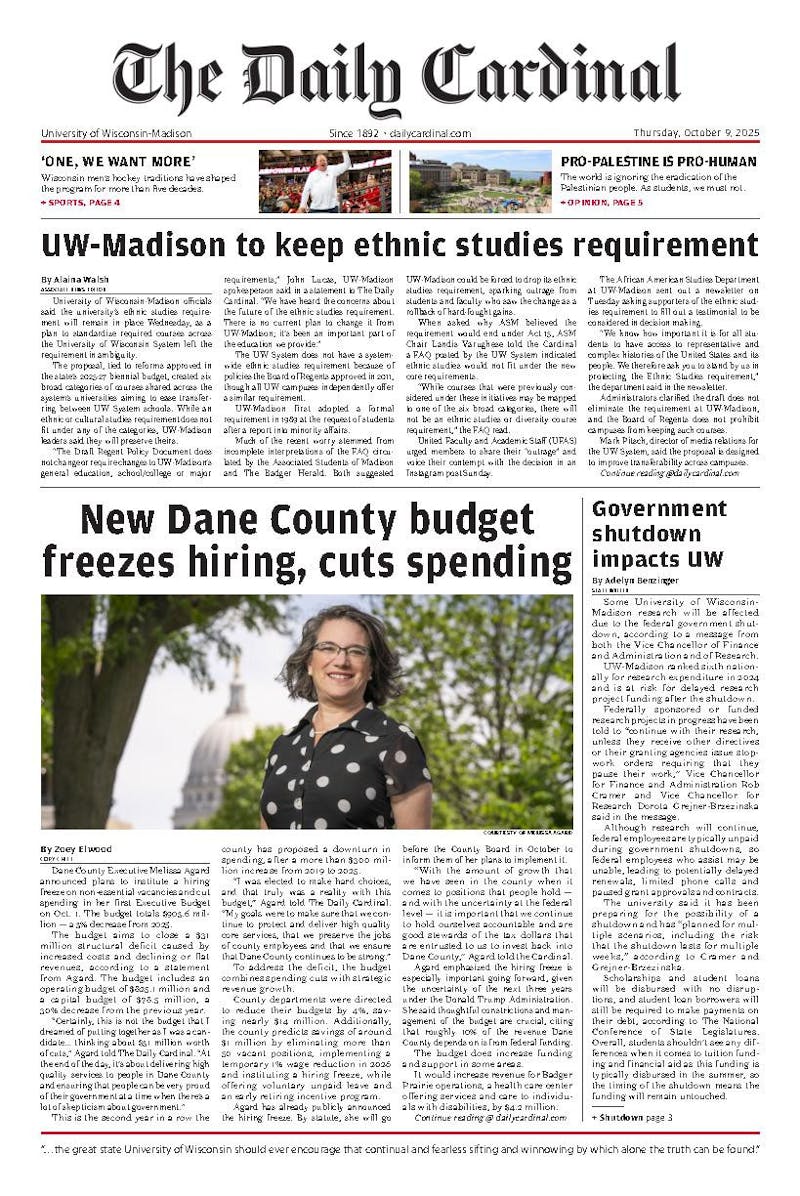Senior Jordan Pasbrig ran for the 23rd Session of the Associated Students of Madison in 2016 after learning the state opted to make student segregated fees optional in the state of Wisconsin.
Pasbrig devoted a number of hours his freshman year to ensuring the student segregated fee did not become optional, making sure funding for student programs would be around for years to come. When his senior year came around, he ran for Chair of SSFC in order to utilize the knowledge he gained surrounding his lobbying work.
ASM has a plethora of sub-committees that represent the student body in various ways within UW-Madison. As one of the largest committees, SSFC, deals directly with student segregated fees.
Segregated fees are a part of student tuition SSFC allocates to various student organizations on campus as well as various student services, such as the Union and the ASM Bus Pass. In the 2019-’20 school year, over $58 million of student tuition money will be allocated by SSFC.
Pasbrig spoke on how SSFC deals directly with student funds, making it a disappointment that student voter turnout for the 26th session of ASM hovered just below seven percent.
“I feel like it’s really had to say we’re a representative of the student body when we only have voter turnout that looks like that,” Pasbrig said.
Jack Halama, a sophomore on the committee spoke about the ways ASM as a whole wants to combat the lack of student awareness on campus.
“It doesn’t feel like you’re representing the student body in some ways, but at the same time obviously taking the initiative to run and be on this committee I’m going to do the best I can to represent how I think the students would want to be represented,” Halama said.
Sophomore Lauren Westlund described her lack of engagement with the student government to be a direct cause of the lack of information ASM, as an organization, provides the student body as a whole.
“I feel like they should somehow reach out to the student body and let the student body know when their elections are and what they do,” Westlund said. “I haven’t really heard of any voting and I haven’t been prompted to vote through email or anything like that, at least not that I know of.”
Halama expressed how the entirety of ASM is disappointed in the election turnout, stating that the only time there has ever been an election over 10 percent is when there was a referendum in place, such as the building of the Natatorium or the Nicholas Recreation Center; spiking voter turnout to around 30 percent.
ASM has unique power at the university since they provide assistance to the chancellor, making it even more important that students get involved, according to Halama.
Pasbrig echoed Halama’s message, emphasizing the educational work that needs to be done if ASM hopes to turnover better election percentages in the future.
“I feel like if everyone had the understanding that I do as Chair they’d be like ‘Oh, that’s important and I should vote in this — or even run myself,’” Pasbrig said.
ASM has recognized the importance of having a larger portion of the student body involved in their elections, reconciling the fact that it is in their hands to increase awareness campus-wide if they hope to have better turnout for the 27th session election.
“Our press director, Matthew Mitnick, is going to do a really good job this year initiating some new election stuff that’s hopefully going to increase that turnout,” Halama said. “I know that’s very preliminary stages right now, but I know that’s a goal of ours to increase awareness of ASM and hopefully increasing that awareness will in turn increase voter turnout.”
In addition to low polling numbers in elections, ASM often struggles to fill all spots of their committees, often times leaving spots unoccupied or filled by students who received less than two votes in the election.
“When I stepped into the role it was all of sudden meetings with the chancellor, meetings with vice chancellor for student affairs, and I meet with the dean of students every week. This is actually such an important role,” Pasbrig said.
SSFC generally has a slight uptick in polling numbers compared to other committees that solely represent a specific school, since every single student can vote in the SSFC election, regardless of what school they are in.
“The unique thing about SSFC is that we deal with money and people care about money and see a direct effect in how much they pay every year,” Halama said. “So that’s the most important thing, we have to be extra careful and extra responsible in how were acting. Just because we have a different realm of importance doesn’t take away from any of the other crucial aspects of ASM.”






